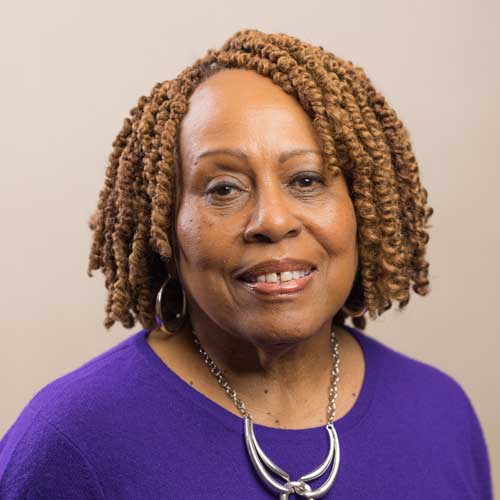Carmen Roberts is the first from-our-ranks SEIU 2015 member to be elevated to the position of Executive Vice President of our statewide union. A longtime member of the union’s Bargaining Committee for Los Angeles County IHSS providers, Carmen has served on her union’s Executive Board for nearly a decade, became a Regional Vice President for L.A. County in 2017, and most recently became the union’s very first statewide member leader for home care: First Vice President, Home Care Industry. This position was created in 2021 to ensure that home care workers across the state utilize their power in numbers to advocate for improvements and standards in the state’s In-Home Supportive Services program.
As Executive Vice President, Carmen draws on all her personal experience as a caregiver—as well as all the many leadership hats she’s worn here at the local and beyond—to this role. Carmen brings special focus to Region 1. With member leaders there, Carmen continues her commitment to building power and bringing structural change to the region’s long-term care industry.
At our 2024 SEIU International Convention, Carmen was elected to serve on SEIU’s International Executive Board—the first SEIU 2015 rank-and-file member to sit on this board.
Carmen can still remember the moment when she realized just how deeply meaningful it was to be a long-term care provider. She was new to her union, and it was a conversation with her union organizer who—with compassion in her voice—helped Carmen see that it takes a special kind of kindness, patience, and skill to ensure our recipients feel good about themselves. Ensuring that they have all the dignity they deserve lifts up the entire community.
That conversation opened Carmen’s eyes and she realized caregiving was bigger than just Carmen and her dad—it was a broken industry employing millions of compassionate caregivers, limping along with inadequate funding, low wages, insufficient training and a ballooning population in need of long-term care.
From that moment, Carmen decided to bring her skills and energy to her union. Recently retired at the time, she had been a nationwide logistics and supplies manager for AT&T, overseeing a large budget. There, she saw that her staff belonged to a union (the Communication Workers of America), but it wasn’t until she became a part of her long-term care providers’ union that it “clicked” and she saw the value of a union that empowers low paid workers—most of them women of color—to better their lives and have a voice in their industry.
Carmen immediately got to work reaching out to other care providers in her area, helping them catch the same vision for the dignity of their work, the dignity of their consumers and the dignity and respect they could demand by standing together in their union. She knew that because home care providers were isolated and didn’t share a common workplace, staying connected was the only way to wield collective power.
Soon after getting involved, around the time of the housing collapse and Great Recession, a bank was trying to take a home care provider’s home. Carmen helped organize a picket at the bank president’s home that resulted in saving this woman’s home.
After that, Carmen’s role as a member leader and activist only grew. She got involved in pretty much every aspect of her union’s work. She spoke out everywhere from local churches in her city of Pasadena to Sacramento and Washington, D.C., attending rallies, lobbying elected leaders, speaking to reporters.
Like many who are especially compassionate, Carmen developed her caregiver’s heart through tragedy. Carmen lost her mom when she was only 8½, and as the oldest, became a sort of mom to her younger siblings. Although it might sound mystical, Carmen believes her mom was led to teach Carmen things that you normally don’t teach a small child. Her mother was a big reader who expanded Carmen’s world far beyond their small South Carolina town. She taught Carmen to cook and shop and handle money. She learned the importance of getting small gifts for people and being a lady.
During the pandemic, Carmen went into overdrive to ensure members stayed connected and felt supported. Already isolated, she knew it was important to reach out, ensure providers knew they had a union looking out for them, and got all the updates about PPE, vaccination and other lifesaving information during the pandemic.
Carmen is working toward that day when long-term care is recognized as a real career. When young people will say “I want to go into long-term care work” like others choose engineering, medicine, and law; when our elderly consumers and people with disabilities are heard and respected, not forgotten.
